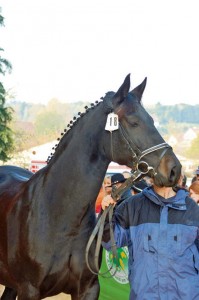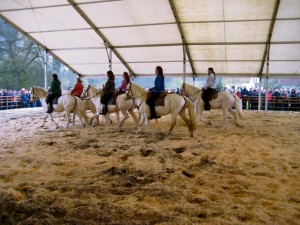Every second Wednesday in November, the village of Quirnbach holds its traditional horse market. The event will include a horse show with awards, vendors, food specialties, musical entertainment and a raffle.
“We are a village with 500 inhabitants and expect about 20,000 visitors Wednesday,” said Elke Blomeyer from the organizing team. “The event is based on the long market tradition our village has.”

The horse awards ceremony at Quirnbach’s horse market starts at 9:45 a.m. Wednesday.
In 1444, historical documents mention the first market, called “Bartholomäusmarkt.” The local church, Bartholomäus Church, was known as a place for pilgrimage.
With the pilgrims, the vendors came to sell all kinds of merchandise. Quirnbach turned into a community with monthly markets after the town of Kusel was burned down during the French Revolution in 1794.
The Kusel markets had to move to Quirnbach. According to a document dated April 26, 1799, every third day of the month a cattle market was authorized. After Kusel was rebuilt, city officials wanted the markets back. But vendors and farmers from the local areas and even neighboring countries wanted to keep going to Quirnbach.
In the years 1856 and 1857, 25 markets were held each year in Quirnbach. Local people made good money with the many guesthouses and inns they needed to feed all the visitors. Until around 1900, every second house in the village was turned into an inn.
After around the middle of the 19th century, horses were not only owned by noble people but also used as draught animals by farmers. Quirnbach officials decided to hold their first horse market on Saint Martin’s Day of 1877. The date in November was a good one for farmers. The crop was in and the financial situation was balanced. People had the time to visit the horse market. They sat together, celebrated and had fun. They started having dances. Since at that time arranged marriages were still customary, the horse market turned into the “marriage market.”
Also, the village asked the government to give authorization to hold a lottery, where people could win household items and agricultural machines.
The main prizes were horses. The first time, 5,000 lottery tickets were sold. In 1892, 24,000 tickets were sold, and in 1893, more than 300 ticket vendors traveled through the Pfalz to sell the tickets.
After World War II and due to a growing motorization of agriculture, the cattle and horse market lost its importance. Better streets allowed farmers to visit their cattle dealers at any time and not only during the market.
Soon, Bartholomäusmarkt turned into a village carnival. In the beginning of the 1980s, community officials, local clubs and business people helped to revive the horse market and the lottery. The market will start with the awarding of horses at 9:45 a.m.

“About 100 horses and 13 breeds will take place,” Blomeyer said. “In between the presentation and awarding of horses, there will be shows with wagons and children have the chance to ride ponies.”
Lottery tickets will be sold for €1 a piece. The first prize is a seven-day cruise for two; second prize is an overnight in a local hotel with breakfast and three-course dinner; and third prize is a tablet PC to be followed by more valuable prizes.
“The Quirnbach horse market also features more than 110 vendors’ stands and booths with clothes, shoes, horse equipment, jewelry, leather items, fruit, spices, sweets and Christmas cookies,” said Volker Zunkel from the organizing team.
Food and beverage specialties during the event include haxen, bratwurst, barbecue delicacies, potato waffles, pea soup and pizza.
Musical entertainment will be provided throughout the day in the festival tent. Quirnbach is located near Glan-Münchweiler on autobahn A62. The main road in Quirnbach will be closed to motorized traffic.
The German railroad company will offer additional trains departing from Kusel and Glan-Münchweiler, and Kaiserslautern and Glan-Münchweiler. Busses will be available at the Glan-Münchweiler train station to take visitors to the horse market. For details, visit www.vrn.de.


